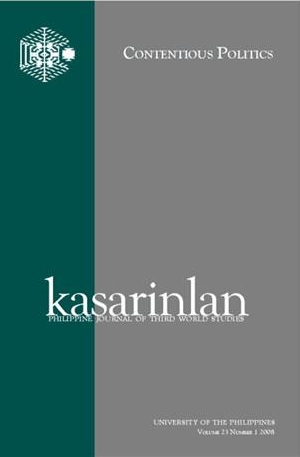Development NGOs, Semiclientelism, and the State in the Philippines: From “Crossover” to Double-crossed
Abstract
Civil-society participation continues to be a considerable focus of debate surrounding politics and public-policy making at international and national scales, especially in the developing world. Important examples of such processes have occurred in the Philippines. The Philippine polity is widely regarded as embodying a culture of clan-based politics entailing considerable relationships of clientelism and semiclientelism. Yet there is also considerable evidence of widespread civil-society activism. This paper examines how politically left-of-center development nongovernment organizations (NGOs) and people’s organizations (POs) have attempted to “cross over” to state positions in order to implement social and economic reforms. Select engagement by key personnel from the NGO sphere has often been premised on the notion that it was aimed at transforming these features of Philippine politics. Engagement with two recent and (claimed to be) reforming governments has not led to positive outcomes. The Philippine experience, for the most part, is an expression of the problematic assumptions that have tended to inform the debate over civil society and state interaction in many developing-country contexts. Such conceptions have been inserted into an all-encompassing notion of democratic transition, whereby political and economic liberalization are supposed to emerge in synergy, with civil society acting as a form of “stabilizer” compensating for and complementing the role of the state. Given the predominance of such weak states as the Philippines in the developing world, it is important to consider what the impacts of development NGOs participation may be. Most important, what may be the impacts of such forms of participation in a society and polity characterized by entrenched clientelist relationships? Contrasting a Gramscian analysis with Putnam-inspired conceptions of civil society that underpin the transition model, the paper argues that far from being a conditioning force on the state, civil society is itself a sphere where clientelism and semiclientelism predominate. So powerful are these forces, that arguably well-intentioned NGO personnel who previously adopted a critical stance toward neo-clientelism ultimately become absorbed by these relationships.
How to Cite
REID, Ben.
Development NGOs, Semiclientelism, and the State in the Philippines: From “Crossover” to Double-crossed.
Kasarinlan: Philippine Journal of Third World Studies, [S.l.], v. 23, n. 1, p. 4-42, nov. 2008.
ISSN 2012-080X.
Available at: <https://journals.upd.edu.ph/index.php/kasarinlan/article/view/1124>. Date accessed: 21 sep. 2025.
Section
Articles
Keywords
civil society; clientelism; semiclientelism; development NGOs; Philippines
By submitting a manuscript, the authors agree that the exclusive rights to reproduce and distribute the article have been given to the Third World Studies Center.



